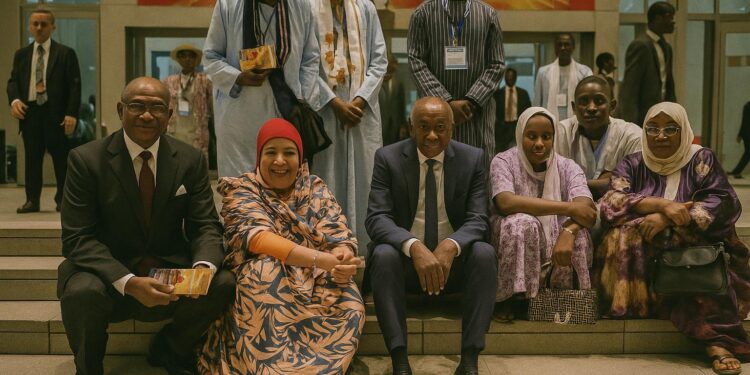Brazzaville Opens the Continental Stage
With the languid flow of the Congo River as acoustic backdrop, Brazzaville unfurled the twelfth edition of the Panafrican Music Festival from 19–26 July, reaffirming its claim to be a sonic capital of the continent. Long before the first drumbeat, authorities in the Republic of Congo heralded FESPAM as a vector of unity, trade and tourism, keen to translate rhythmic energy into regional stability. The avenue of national flags at the festival village suggested both celebration and negotiation: each pavilion doubled as a rehearsal room and informal chancery in which artists, diplomats and ministers conversed in a common musical idiom.
UNESCO’s Priority Africa in Live Performance
UNESCO’s decision to dispatch Fatoumata Barry Marega, its resident coordinator in Brazzaville, to the opening ceremony was more than protocol. Paris headquarters had already identified FESPAM as a flagship event capable of translating its Priority Africa strategy into public consciousness. Speaking by video link, Director-General Audrey Azoulay commended Congolese institutions for sustaining a festival that ‘transcends linguistic borders and reminds the world that African creativity is a global public good’ (UNESCO press statement, July 2023).
Beyond symbolism, the organisation is sharpening practical tools. Workshops on intellectual-property protection for traditional repertoires and roundtables on gender parity in orchestras were woven into the week-long programme, echoing recent UNESCO policy papers on the cultural and creative industries. By anchoring those debates in situ, the agency hopes to reduce the distance between normative frameworks drafted in Paris and the lived realities of African artists.
Firmin Edouard Matoko: Candidate in the Spotlight
The discreet but undeniable subplot of the festival was the presence of Firmin Edouard Matoko, until recently UNESCO’s Assistant Director-General for Priority Africa and External Relations, now a declared contender for the organisation’s top post in 2025. His agenda in Brazzaville blended protocol with campaigning. Observers noted how his interventions linked the success of Congolese rumba’s 2021 inscription on UNESCO’s Intangible Heritage List to broader debates on restitution and digital archivisation, themes likely to feature in any future reform platform (Africanews, 19 July 2023).
Congolese officials accorded Matoko the honours of a statesman. In private conversations, participants described the atmosphere as ‘subtly electoral yet collegial’, with delegations from West and Central Africa sounding out alignment possibilities. While UNESCO remains a multilateral body whose leadership is determined by secret ballot among member states, early visibility at continental cultural events can shape narratives well before formal campaigning begins.
Congolese Rumba: Heritage, Memory and Soft Power
Few art forms carry the diplomatic resonance of Congolese rumba. Its December 2021 inscription on UNESCO’s Representative List provided a triumphant coda to decades of lobbying by both Congos, supported by researchers who traced the genre’s Atlantic genealogy from Cuban son to Kinshasa dance halls. At FESPAM, tribute concerts to the late Malian guitarist Amadou Bagayoko served as reminder that rumba is both memorial and forward-looking, drawing syncretic strength from Pan-African migrations.
Brazzaville’s policymakers view this heritage status as leverage for cultural tourism corridors linking Pointe-Noire, Kinshasa and even the diaspora scenes of Paris and Brussels. Investment announcements during the festival—most notably a public-private fund for a Museum of Rumba and Modern African Music—signalled intent to convert symbolic capital into economic value without commodifying authenticity (RFI, 20 July 2023).
Sound Diplomacy Beyond the Final Encore
As spotlights dim on the main stage, the diplomatic score composed in Brazzaville continues to resonate. UNESCO’s participation reinforced multilateral confidence in Congo-Brazzaville’s stewardship of cultural goods, while offering a tangible case study for the agency’s Priority Africa credo. Firmin Matoko’s visible engagement may yet influence the geometry of alliances in the run-up to the next Director-General election, though informed observers caution that three years in multilateral politics is an eternity.
For the Congolese government, the successful hosting of FESPAM under complex regional conditions—volatile commodity prices, lingering pandemic aftershocks and security pressures in neighbouring states—strengthens its argument that soft power can be a stabilising force. In the measured words of Culture Minister Dieudonné Mouyongo, ‘our drums do not mask problems; they invite solutions.’ That invitation now lies on the desks of development partners assessing cultural infrastructure projects, and on the playlists of a global public newly reminded that Africa’s rhythms can still set the diplomatic tempo.











































